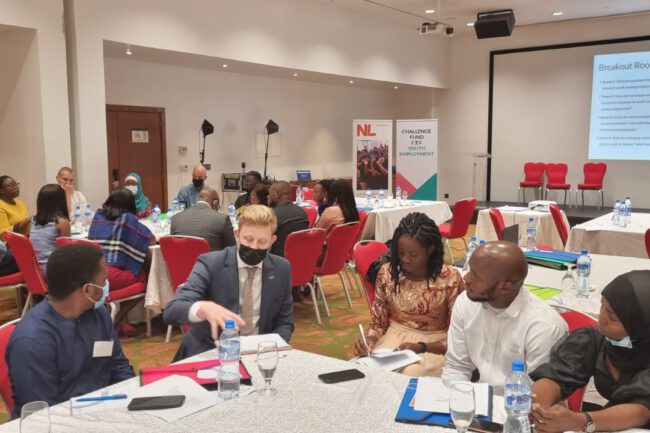CFYE, together with the Dutch Consulate in Lagos, Nigeria, successfully organized the first Meaningful Youth Participation Event. As a Youth Employment Strategy (YES) initiative, the event aimed to bring the youth, the private sector, knowledge institutes, and policy-makers together to create a bold vision for youth employment and entrepreneurship in Nigeria. CFYE’s Youth Champs in Nigeria developed and facilitated the event, building on their Youth Action Research.
Meaningful Youth Participation is a key pillar of the Dutch Youth at Heart Policy, especially for YES! Nigeria. The event focused on how youth can be more involved in the decision-making process and be active co-creators of innovative solutions to youth employment, especially in the Digital Economy of Nigeria. Therefore, we asked our Youth Champions to lead the conversation and bring the most pressing employment issues for Nigerian youth to the table.
More than 70 people attended, and the event created great enthusiasm among the audience. Our Youth Champs, Hannah Silas, Goodness Obijuru, Umar Abdullahi, and Richard Dambo, presented the most prominent findings of the Youth Action Research to showcase how Nigerian youth experience and relate to employment. The report took a holistic approach and went from the structural roadblocks to youth unemployment to the individual aspirations of the research participants. Key insights from the report revealed that youth experience frustrations with corruption, nepotism, and tribalism, as well as with the experienced government inability to match skills and workplaces, to provide upskill training to the youth or to work with schools to create curricula that will equip them with skills necessary for employment. The report highlighted four overarching recommendations that youth feel are critical to support youth with employment in Nigeria:
- Provision of funding or opening the way for young entrepreneurs will both reduce unemployment and allow youths to develop into the job market in their own way.
- Current youth employment policies need to be reviewed, focusing on supporting youth into employment and critically examining how to implement the policies well.
- School curricula need to be overhauled to ensure digital skill proficiency and competency.
- Government policies need to enable new business growth.
The Consular General of the Kingdom of the Netherlands, and Tijmen Rooseboom, the Ambassador of Youth, Education and Work, presented their vision as well. On top of this, a panel discussion with representatives from youth, the public – and private sector examined how to ensure youth, companies, and government can work together to increase access to emerging jobs for Nigerian youth.
The final part of the event divided the audience into four breakout sessions focusing on the following:
- What practical steps can youth, companies, and government take to close the skills gaps between youth seeking employment and labour market demand in Nigeria?
- How can we ensure youth are given a seat at the table with companies and the government to create innovative solutions to youth unemployment together (particularly to help increase access to emerging sectors/digital jobs)?
- Using the recommendations from the youth action research, how suitable are these recommendations? How effective could they be if implemented? What can be done to implement some of these recommendations?
- With the changing world of work, how do we address security concerns for youth working in the digital sector in Nigeria? What kind of protection should be provided to young employees?
“Create formal spaces for youth to participate within government to share and value youth voice at the highest level.”

The breakout session led to many energetic recommendations for different layers of private and public organizations:
- Engagement: There should be more spaces/conferences/dialogues with the private sector, knowledge institutions, government, and youth to discuss major issues such as youth employment, security, and the rights of the youth.
- Information: More access to information on decision-making opportunities to participate meaningfully.
- Intentional: Opportunities for youth to engage should have a clear purpose and outcomes that can be implemented. This is crucial to avoid tokenism.
- Peer-to-peer awareness-raising – youth need to advocate for and empower other youth to come forward and have their voice heard in the existing spaces.
- Collaboration: Create a formal space for youth to participate within government to share and value youth voice at the highest level.
- Private-sector employers need to be more accountable and create spaces for young employees/youth voices to be heard within management. They also need to support young employees in securing their legal and human rights. Some initiatives that can be implemented include the provision of formal identification for young employees, training young employees on dealing with security/harassment, and access to free or subsidized legal advice to employees who have experienced security/harassment by security forces.
- The government needs to conduct more training and sensitization with the security operatives, including emotional intelligence and communication skills training (police, SARS).
- Review and reevaluation of the existing relevant laws and policies to identify gaps.
The audience left the event with new ideas and fresh enthusiasm for promoting meaningful youth participation in Nigeria. We will use the feedback and results from the breakout sessions to feed into the second call of the CFYE in Nigeria and the Dutch YES! initiative.
We would like to express our thanks and gratitude to our Youth Champions, the Dutch Consulate, and all the participants for making this such a fruitful event.